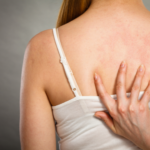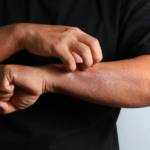Apple cider vinegar is beneficial for a lot of issues – whether you want to get rid of stinky feet, get rid of acne, get rid of your cellulite, lose weight, whiten your teeth, or even treat a sunburn. One thing that isn’t as commonly known is that apple cider vinegar can be used to help treat eczema, including baby eczema.
An effective apple cider vinegar baby eczema treatment is to mix and apply a 50/50 solution of apple cider vinegar and water. Apple cider vinegar has antifungal and antibacterial properties. It also helps to restore the skin’s natural pH. This will help heal and prevent eczema from your baby.
Read on to see how we used apple cider vinegar to control and heal eczema on our baby. You’ll also learn how else you can help your baby with apple cider vinegar.
What is Baby Atopic Eczema?
Eczema (atopic dermatitis) affects about 10 to 20% of babies to some degree. Atopic dermatitis eczema is the most common form of eczema. It is characterized by irritated and inflamed skin. Those who deal with this problem may get rashes on the face, wrists, knees, hands, and soft skin behind the knees. Sometimes rashes appear over the baby’s entire body.
The itchiness sometimes develops to the point where the affected individual can not hold the urge to scratch the spot until it bleeds. Babies lack control, so of course, they will scratch. There are many pharmaceutical solutions to this problem, but some of the lotions and over-the-counter drugs may cause side effects.
Apple Cider Vinegar Helps Soothe and Relieve Baby Eczema
Apple Cider Vinegar has been around for centuries as a whole remedy, so there’s no wonder there are so many uses for it. It’s become one of the hottest natural treatments for a number of issues. I apply an apple cider vinegar baby eczema treatment when my daughter gets a sunburn. I use apple cider vinegar whenever I feel a migraine coming on. I drink a tablespoon of apple cider vinegar when I have indigestion.
Instead of reaching for conventional medication, consider trying apple cider vinegar for eczema. It is a super simple yet effective remedy for it. You can boost its power by combining it with other mighty ingredients, but first, let’s go through the healing property provided by apple cider vinegar (ACV).
ACV has antifungal potential. It kills off bacteria that cause atopic dermatitis eczema. When used regularly, its antifungal and antibacterial potential prevents bacterial growth. It will help reduce inflammation in the skin with consistent use.
Beta-carotene in apple cider vinegar stimulates cell renewal and provides a healthy skin complexion.
Apple cider vinegar is packed with potassium. Potassium also balances the skin’s pH levels and has the role of an astringent. This mineral is also known for its ability to alleviate skin allergy eczema symptoms and to reduce inflammation. To learn more about how long a skin allergy lasts, as well as the eczema symptoms, see my post: How Long Does Skin Allergy Last?
In addition to its mineral and vitamin content, apple cider vinegar may help with digestion. Atopic dermatitis eczema can be the result of poor digestion, with backed-up food causing leaky gut. ACV may help your body eliminate any toxins that may also trigger the occurrence of eczema.
It also enhances your immune function. Apple cider vinegar contains some great nutrients, including acetic acid, vitamin b1, pectin, mineral salts, and riboflavin. These contribute to optimal immune function and will help eczema flare-ups and itching.
Apple cider vinegar for eczema is very effective. It does miracles to dry skin and eczema symptoms. Dry skin and sensitive skin are tightly connected to the appearance of eczema. Use it to help eczema flare-ups from occurring and to relieve any unpleasant itching. Use apple cider vinegar in combination with other beneficial ingredients. Try different homemade remedies and make sure apple cider vinegar is the start of each recipe.
To learn more about the benefits of apple cider vinegar on your skin, see our earlier post: Is Apple Cider Vinegar Harmful or Helpful for Your Skin?
Apple Cider Vinegar Baby Eczema Treatment
Human skin is protected by a natural, semi-acidic barrier. Skin with eczema has higher pH levels. This causes the barrier not to work correctly. Moisture doesn’t stay, and irritants enter. Apple cider vinegar is acidic, so applying it to the skin may help restore your baby’s natural pH levels.
We saw the results of ACV on eczema first-hand because we used it on our own baby when she had some eczema.
All you’re going to need for this home remedy is a glass of warm water and your apple cider vinegar. Depending on how much you might need, you want to do 50/50. So I recommend starting out mixing about 1/4 cup water with 1/4 cup apple cider vinegar.
If your baby has very sensitive skin, I suggest you use more water than apple cider vinegar to dilute it even more. So use a ratio of about 1/2 water with 1/4 apple cider vinegar. You’re going to stir that up very well and apply it with a cotton ball or pad. Or you can even put it in a spray bottle.
Take the cotton pad, dab it in the mixture, and then gently rub it on the affected areas. Do this twice a day, and your baby should see and feel an improvement and relief in their eczema.
Use Apple Cider Vinegar as a Gentle Baby Exfoliator
Another way you can use ACV for eczema is as a sort of gentle exfoliator. Apply this home remedy to the rash or eczema to remove some of that dead and flaky skin. To do this, find a really mild cleansing milk (or warm water), mix in the apple cider vinegar, and also baking soda.
You don’t want to use too much as this can irritate the baby’s skin. Use only about 1/4 teaspoon of baking soda, 2 tablespoons of apple cider vinegar, and about 2 tablespoons of the cleansing milk (or water). This is also really good if your baby has sensitive skin, not just for eczema.
You’re going to see it nicely bubble up as you mix them together. If you do not have a cleansing milk, you can use water. You want to use more milk or water than ACV to give a little moisture to the mixture because vinegar and the baking soda by themselves can be very drying. And, of course, after applying, you always want to moisturize the skin with an effective baby eczema cream (link to our top 3 favorite baby creams). Coconut oil is one of my favorite natural moisturizers. Apply coconut oil to your baby’s skin after rinsing the apple cider vinegar off. Coconut oil helps to lock in moisture and keep the skin hydrated.
Stir the mixture well so that it’s well-mixed. Gently rub it onto your infant’s sensitive skin. You can do this while bathing them. Apple cider vinegar baths are very effective for treating baby eczema. Let the ACV sit for about a minute, and then rinse it off well with lukewarm water and then moisturize. Give your baby apple cider vinegar baths once or twice a week, and you’ll see an improvement in their sensitive skin. A warm bath combined with the ACV is a perfect combination to treat eczema.
Other Ways Apple Cider Vinegar Can Help Your Baby

There are many other ways you can incorporate apple cider vinegar into your care routine for your baby, including for scalp eczema, sore throats, and cleaning with baby wipes.
Use Apple Cider Vinegar for Scalp Eczema
A surprising way to use apple cider vinegar is on the hair. I came across this when I was looking for a natural alternative home remedy to cleanse my baby’s scalp as there was eczema and dry skin on her scalp. I did a little research on the computer, and I found out how.
Take a quarter cup of water and a quarter cup of apple cider vinegar, pour both in a spray bottle, part your hair section off just a little, spray the solution onto the scalp. Follow these steps while giving your baby apple cider vinegar baths. For a bulk solution, increase the volume to 1 cup or 2 cups, or mix into a warm bath. A warm bath with ACV will feel soothing on the baby’s skin and scalp. It acts like a dandruff spray to make sure that the baby’s scalp is clean and healthy. The acidity of the vinegar is a good thing. It may help to kill off fungi that contribute to eczema, sensitive skin, flaky skin, and dandruff.
Use Apple Cider Vinegar for Sore Throats
Another method I discovered is if your little one has a sore throat. I call this an apple cider vinegar throat elixir. My kids kept getting sore throats this past winter, and I just didn’t want to keep giving them chemicals, so I went online, did some research, and this worked.
It’s a teaspoon of the apple cider vinegar mixture (50/50 water and vinegar), three tablespoons of clover honey, and depending on the age of your baby, and a teaspoon of cayenne pepper. It’s best to leave the cayenne out for very young babies. It is a little tangy, not too spicy on this mixture. Mix all together with warm water and spoon-feed to your baby.
My 2-year-old had no problems with the cayenne pepper. It’s a little tangy, but it does the trick. This elixir is a triple threat. The Apple cider vinegar and the honey have antibacterial properties, and the capsaicin (cayenne) will eliminate pain. Topically, you can put this mixture on your joints also.
Use Apple Cider Vinegar with Baby Wipes
Another tip for apple cider vinegar is for wiping your baby’s sensitive skin with baby wipes. Take 1 cup or 2 cups of cider vinegar and put it in a baggie with unscented baby wipes. You can put this bag in the refrigerator overnight, and the next day it will soak up all the apple cider vinegar. You can then use the wipes to gently wipe any mess the baby had made or when changing diapers. This can be a convenient alternative to apple cider vinegar baths.
You can also use these wipes to prevent eczema, wiping your infant’s feet, hands, and between all crevices, between the toes, fingers, neck, or anywhere eczema might pop up.
Conclusion
To recap, an effective apple cider vinegar baby eczema treatment is to use 50/50 apple cider vinegar and water. You can spray this mixture on your baby’s skin or give your baby apple cider vinegar baths once or twice a week. The benefits of apple cider vinegar for eczema are many, including having antifungal and antibacterial properties. It also may help to balance out the skin’s natural pH levels. This will help treat eczema (atopic dermatitis) on your baby and prevent it from coming back.
The vinegar actually changes the pH levels on the skin, making it really hard for bacteria to grow. Its antimicrobial and antifungal properties will help treat eczema and keep it developing on your little one’s precious skin.
If your baby’s eczema gets worse, it is important to see a doctor for medical advice. The doctor will diagnose the severity of eczema and provide medical advice on how to properly treat it.
If you’re going to use apple cider vinegar for your baby, remember that baby eczema also needs a good moisturizer. See our top 3 eczema creams for infants to see which creams are best at moisturizing and hydrating your little one’s skin.

![Hot Spoon Mosquito Bite Treatment [Does It Help and How To] hot spoon mosquito bite](https://skincaregeeks.com/wp-content/uploads/2021/05/hot-spoon-mosquito-bite-150x150.jpg)





